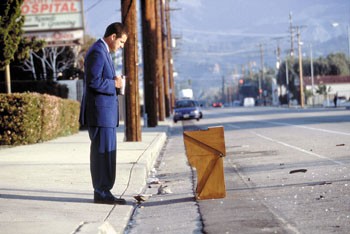Love Stinks
On cannibalism, romantic comedies, and ‘Punch-Drunk Love’
Writer David Templeton takes interesting people to interesting movies in his ongoing quest for the ultimate postfilm conversation. This is not a review; rather, it’s a free-wheeling, tangential discussion of art, alternative ideas, and popular culture.
The biggest problem with most modern films,” author Susanna Kaysen says, “is that in the first half they start out trying to be one thing, and then in the last half, for no reason, they suddenly subvert themselves and become a completely different film. I don’t get it.”
Case in point: Punch-Drunk Love, starring Adam Sandler and Emily Watson. It’s a disturbing love story about a shy, emotionally wounded plunger salesman and the sweet English oddball he falls for. The various subplots involve pudding, phone sex, and a creepy musical instrument.
That much is fine, argues Kaysen, the author of Girl, Interrupted, the memoir that inspired the popular movie. Her most-recent work is The Camera My Mother Gave Me, a one-of-a-kind page-turner about Kaysen’s anti-adventures with vaginal disease. Obviously, Kaysen has an affinity for the offbeat, and she was thrilled by the ultrabonkers opening scenes of Punch-Drunk Love.
“The first two-thirds was so great,” she says. “Remember the one sex scene? When they’re in bed and she says, ‘I want to bite your cheek,’ and he says, ‘I want to smash your face in with a shovel?’ I watched that scene and thought, ‘This is fantastic! These people are both totally psychotic and somehow, they’ve found each other!’
“They’re not going to do these things, of course, but they are fantasies of engulfing and absorbing the other, articulating very well the feelings that lovers have about each other at the beginning of a relationship.
“Then,” Kaysen continues, “her whole character shifts, and she turns into this saintly, maternal type of person–and the whole movie goes ppthhhhhtttttph!”
For the record, I liked the movie. “Don’t you think,” I boldly suggest, “we’re supposed to believe that his love of her is helping him to, you know, heal?”
“Oh, ugh, disgusting, gross, I hate that,” she replies, “but that probably is what we’re supposed to believe. And that’s the kind of thing that makes me want to just stay home and never walk out the door. It’s such a lie and it’s such a fantasy, and it’s just a bunch of American recovery crap and I hate it.”
“What’s crap?” I ask. “That love can help us heal our family wounds?”
“Yeah, that’s crap,” Kaysen tosses back, with a morose laugh. “I don’t think love does help us heal. Love is just another arena in which we play those wounds out. Oh, what do I know? I’m a terrible cynic, a miserable, lonely person, but I think that adult relationships are where you rehash and redo all the damage that was done to you when you were a child.”
She pauses a moment, then says, “I was totally thrilled by the first hour of this movie because I was thinking, ‘Wow. This is a totally nightmarish, surrealistic vision of life in America,’ and I was fascinated by that.”
“So what is it you have against romantic comedies?”
“Well, for one thing,” Kaysen says, “life isn’t like that, and it’s depressing. Romantic comedies make me sad. The whole idea of everything working out in the end, the idea that love will save you. That’s so rarely born out in experience.
“Life is so odd and unpredictable,” Kaysen muses. “In the movies, the drive is for everything to work out–so it does work out. Everyone ends up happy, even when the people involved are talking about smashing each other’s faces in with a shovel. And then, they still get to live happily ever after.
“In real life,” she laughs, “you just get smashed with the shovel.”
From the October 31-November 6, 2002 issue of the North Bay Bohemian.









